- Home
- Ken Follett
Triple Page 11
Triple Read online
Page 11
The fair-haired man ordered a drink and looked at his watch. He did not see Dickstein observing him. Stiffcollar entered a few minutes later. He wore a red V-necked sweater and a white shirt with a button-down collar. As before, he went straight to the table where his friend sat waiting. They greeted each other with a double handshake. They seemed happy. Dickstein prepared to shatter their world.
He called a waiter. "Please take a bottle of champagne to that table for the man in the red sweater. And bring me another beer."
The waiter brought his beer first, then took the champagne in a bucket of ice to Stiffcollar's table. Dickstein saw the waiter point him out to the couple as the donor of the champagne. When they looked at him, he raised his beer glass in a toast, and smiled. Stiffcollar recognized him and looked worried.
Dickstein left his table and went to the cloakroom. He washed his face, killing time. After a couple of minutes Stiffcollar's friend came in. The young man combed his hair, waiting for a third man to leave the room. Then he spoke to Dickstein.
"My friend wants you to leave him alone."
Dickstein gave a nasty smile. "Let him tell me so himself."
"You're a journalist, aren't you? What if your editor were to hear that you come to places like this?"
"I'm freelance."
The young man came closer. He was five inches taller than Dickstein and at least thirty pounds heavier. "You're to leave us alone," he said.
"No."
"Why are you doing this? What do you want?"
"I'm not interested in you, pretty boy. You'd better go home while I talk to your friend."
"Damn you," the young man said, and he grabbed the lapels of Dickstein's jacket in one large hand. He drew back his other arm and made a fist. He never landed the punch.
With his fingers Dickstein poked the young man in the eyes. The blond head jerked back and to the side reflexively. Dickstein stepped inside the swinging arm and hit him in the belly, very hard. The breath rattled out of him and he doubled over, turning away. Dickstein punched him once again, very precisely, on the bridge of the nose. Something snapped, and blood spurted. The young man collapsed on the tiled floor.
It was enough.
Dickstein went out quickly, straightening his tie and smoothing his hair on the way. In the club the cabaret had begun and the German guitarist was singing a song about a gay policeman. Dickstein paid his bill and left. As he went he saw Stiffcollar, looking worried, making his way to the cloakroom.
On the street it was a mild summer night, but Dickstein was shivering. He walked a little way, then went into a bar and ordered brandy. It was a noisy, smoky place with a television set on the counter. Dickstein carried his drink to a corner table and sat facing the wall.
The fight in the cloakroom would not be reported to the police. It would look like a quarrel over a lover, and neither Stiffcollar nor the club management would want to bring that sort of thing to official notice. Stiffcollar would take his friend to a doctor, saying he had walked into a door.
Dickstein drank the brandy and stopped shivering. There was, he thought, no way to be a spy without doing things like this. And there was no way to be a nation, in this world, without having spies. And without a nation Nat Dickstein could not feel safe.
It did not seem possible to live honorably. Even if he gave up this profession, others would become spies and do evil on his behalf, and that was almost as bad. You had to be bad to live. Dickstein recalled that a Nazi camp doctor called Wolfgang had said much the same.
He had long ago decided that life was not about right and wrong, but about winning and losing. Still there were times when that philosophy gave him no consolation.
He left the bar and went into the street, heading for Stiffcollar's home. He had to press his advantage while the man was demoralized. He reached the narrow cobbled street within a few minutes and stood guard opposite the old terraced house. There was no light in the attic window.
The night became cooler as he waited. He began to pace up and down. European weather was dismal. At this time of year Israel would be glorious: long sunny days and warm nights, hard physical work by day and companionship and laughter in the evenings. Dickstein wished he could go home.
At last Stiffcollar and his friend returned. The friend's head was wrapped in bandages, and he was obviously having trouble seeing: he walked with one hand on Stiffcollar's arm, like a blind man. They stopped outside the house while Stiffcollar fumbled for a key. Dickstein crossed the road and approached them. They had their backs to him, and his shoes made no noise.
Stiffcollar opened the door, turned to help his friend, and saw Dickstein. He jumped with shock. "Oh, God!"
The friend said, "What is it? What is it?"
"It's him."
Dickstein said, "I have to talk to you."
"Call the police," said the friend.
Stiffcollar took his friend's arm and began to lead him through the door. Dickstein put out a hand and stopped them. "You'll have to let me in," he said. "Otherwise I'll create a scene in the street."
Stiffcollar said, "He'll make our lives miserable until he gets what he wants."
"But what does he want?"
"I'll tell you in a minute," Dickstein said. He walked into the house ahead of them and started up the stairs.
After a moment's hesitation, they followed.
The three men climbed the stairs to the top. Stiffcollar unlocked the door of the attic flat, and they went in. Dickstein looked around. It was bigger than he imagined, and very elegantly decorated with period furniture, striped wallpaper, and many plants and pictures. Stiffcollar put his friend in a chair, then took a cigarette from a box, lit it with a table lighter and put it in his friend's mouth. They sat close together, waiting for Dickstein to speak.
"I'm a journalist," Dickstein began.
Stiffcollar interrupted, "Journalists interview people, they don't beat them up."
"I didn't beat him up. I hit him twice."
"Why?"
"He attacked me, didn't he tell you?"
"I don't believe you," said Stiffcollar.
"How much time would you like to spend arguing about it?"
"None."
"Good. I want a story about Euratom. A good story--my career needs it. Now, then, one possibility is the prevalence of homosexuals in positions of responsibility within the organization."
"You're a lousy bastard," said Stiffcollar's friend.
"Quite so," Dickstein said. "However, I'll drop the story if I get a better one."
Stiffcollar ran a hand across his gray-tipped hair, and Dickstein noticed that he wore clear nail polish. "I think I understand this," he said.
"What? What do you understand?" said his friend.
"He wants information."
"That's right," said Dickstein. Stiffcollar was looking relieved. Now was the time to be a little friendly, to come across as a human being, to let them think that things might not be so bad after all. Dickstein got up. There was whiskey in a decanter on a highly polished side table. He poured small shots into three glasses as he said, "Look, you're vulnerable and I've picked on you, and I expect you to hate me for that; but I'm not going to pretend that I hate you. I'm a bastard and I'm using you, and that's all there is to it. Except that I'm drinking your booze as well." He handed them drinks and sat down again.
There was a pause, then Stiffcollar said, "What is it that you want to know?"
"Well, now." Dickstein took the tiniest sip of whiskey: he hated the taste. "Euratom keeps records of all movements of fissionable materials into, out of and within the member countries, right?"
"Yes."
"To be more precise: before anyone can move an ounce of uranium from A to B he has to ask your permission."
"Yes."
"Complete records are kept of all permits given."
"The records are on a computer."
"I know. If asked, the computer would print out a list of all future uranium shipments for which
permission has been given."
"It does, regularly. A list is circulated once a month within the office."
"Splendid," said Dickstein. "All I want is that list."
There was a long silence. Stiffcollar drank some whiskey. Dickstein left his alone: the two beers and one large brandy he had already drunk this evening were more than he normally took in a fortnight.
The friend said, "What do you want the list for?"
"I'm going to check all the shipments in a given month. I expect to be able to prove that what people do in reality bears little or no relation to what they tell Euratom."
Stiffcollar said, "I don't believe you."
The man was not stupid, Dickstein thought. He shrugged. "What do you think I want it for?"
"I don't know. You're not a journalist. Nothing you've said has been true."
"It makes no difference, does it?" Dickstein said. "Believe what you like. You've no choice but to give me the list."
"I have," Stiffcollar said. "I'm going to resign the job."
"If you do," Dickstein said slowly, "I will beat your friend to a pulp."
"We'll go to the police!" the friend said.
"I would go away," Dickstein said. "Perhaps for a year. But I would come back. And I'd find you. And I will very nearly kill you. Your face will be unrecognizable."
Stiffcollar stared at Dickstein. "What are you?"
"It really doesn't matter what I am, does it? You know I can do what I threaten."
"Yes," Stiffcollar said. He buried his face in his hands.
Dickstein let the silence build. Stiffcollar was cornered, helpless. There was only one thing he could do, and he was now realizing this. Dickstein let him take his time. It was several moments before Dickstein spoke.
"The printout will be bulky," he said gently.
Stiffcollar nodded without looking up.
"Is your briefcase checked as you leave the office?"
He shook his head.
"Are the printouts supposed to be kept under lock and key?"
"No." Stiffcollar gathered his wits with a visible effort. "No," he said wearily, "this information is not classified. It's merely confidential, not to be made public."
"Good. Now, you'll need tomorrow to think about the details--which copy of the printout to take, exactly what you'll tell your secretary, and so on. The day after tomorrow you will bring the printout home. You'll find a note from me waiting for you. The note will tell you how to deliver the document to me." Dickstein smiled. "After that, you'll probably never see me again."
Stiffcollar said, "By God, I hope so."
Dickstein stood up. "You'd rather not be bothered by phone calls for a while," he said. He found the telephone and pulled the cord out of the wall. He went to the door and opened it.
The friend looked at the disconnected wire. His eyes seemed to be recovering. He said, "Are you afraid he'll change his mind?"
Dickstein said, "You're the one who should be afraid of that." He went out, closing the door softly behind him.
Life is not a popularity contest, especially in the KGB. David Rostov was now very unpopular with his boss and with all those in the section who were loyal to his boss. Feliks Vorontsov was boiling with anger at the way he had been bypassed: from now on he would do anything he could to destroy Rostov.
Rostov had anticipated this. He did not regret his decision to go for broke on the Dickstein affair. On the contrary, he was rather glad. He was already planning the finely stitched, stylishly cut dark blue English suit he would buy when he got his pass for Section 100 on the third floor of the GUM department store in Moscow.
What he did regret was leaving the loophole for Vorontsov. He should have thought of the Egyptians and their reaction. That was the trouble with the Arabs, they were so clumsy and useless that you tended to ignore them as a force in the intelligence world. Fortunately Yuri Andropov, head of the KGB and confidante of Leonid Brezhnev, had seen what Feliks Vorontsov was trying to do, namely win back control of the Dickstein project; and he had not permitted it.
So the only consequence of Rostov's error was that he would be forced to work with the wretched Arabs.
That was bad enough. Rostov had his own little team, Nik Bunin and Pyotr Tyrin, and they worked well together. And Cairo was as leaky as a sieve: half the stuff that went through them got back to Tel Aviv.
The fact that the Arab in question was Yasif Hassan might or might not help.
Rostov remembered Hassan very clearly: a rich kid, indolent and haughty, smart enough but with no drive, shallow politics, and too many clothes. His wealthy father had got him into Oxford, not his brains; and Rostov resented that more now than he had then. Still, knowing the man should make it easier to control him. Rostov planned to start by making it clear Hassan was essentially superfluous, and was on the team for purely political reasons. He would need to be very clever about what he told Hassan and what he kept secret: say too little, and Cairo would bitch to Moscow; too much, and Tel Aviv would be able to frustrate his every move.
It was damned awkward, and he had only himself to blame for it.
He was uneasy about the whole affair by the time he reached Luxembourg. He had flown in from Athens, having changed identities twice and planes three times since Moscow. He took this little precaution because, if you came direct from Russia, the local intelligence people sometimes made a note of your arrival and kept an eye on you, and that could be a nuisance.
There was nobody to meet him at the airport, of course. He took a taxi to his hotel.
He had told Cairo he would be using the name David Roberts. When he checked into the hotel under that name, the desk clerk gave him a message. He opened the envelope as he went up in the lift with the porter. It said simply "Room 179."
He tipped the porter, picked up the room phone and dialed 179. A voice said, "Hello?"
"I'm in 142. Give me ten minutes, then come here for a conference."
"Fine. Listen, is that--"
"Shut up!" Rostov snapped. "No names. Ten minutes."
"Of course, I'm sorry, I--"
Rostov hung up. What kind of idiots was Cairo hiring now? The kind that used your real name over the hotel phone system, obviously. It was going to be even worse than he had feared.
There was a time when he would have been over-professional, and turned out the lights and sat watching the doorway with a gun in his hand until the other man arrived, in case of a trap. Nowadays he considered that sort of behavior to be obsessive and left it to the actors in the television shows. Elaborate personal precautions were not his style, not anymore. He did not even carry a gun, in case customs officials searched his luggage at airports. But there were precautions and precautions, weapons and weapons: he did have one or two KGB gadgets subtly concealed--including an electric toothbrush that gave out a hum calculated to jam listening devices, a miniature Polaroid camera, and a bootlace garrote.
He unpacked his small case quickly. There was very little in it: a safety razor, the toothbrush, two American-made wash-and-wear shirts and a change of underwear. He made himself a drink from the room bar--scotch whiskey was one of the perks of working abroad. After exactly ten minutes there was a knock on the door. Rostov opened it, and Yasif Hassan came in.
Hassan smiled broadly. "How are you?"
"How do you do," said Rostov, and shook his hand.
"It's twenty years . . . how have you been?"
"Busy."
"That we should meet again, after so long, and because of Dickstein!"
"Yes. Sit down. Let's talk about Dickstein." Rostov sat, and Hassan followed suit. "Bring me up to date," Rostov continued. "You spotted Dickstein, then your people picked him up again at Nice airport. What happened next?"
"He went on a guided tour of a nuclear power station, then shook off his tail," Hassan said. "So we've lost him again."
Rostov gave a grunt of disgust. "We'll have to do better than that."
Hassan smiled--a salesman's smile, Rostov tho
ught--and said, "If he wasn't the sort of agent who is bound to spot a tail and lose it, we wouldn't be so concerned about him, would we?"
Rostov ignored that. "Was he using a car?"
"Yes. He hired a Peugeot."
"Okay. What do you know about his movements before that, when he was here in Luxembourg?"
Hassan spoke briskly, adopting Rostov's businesslike air. "He stayed at the Alfa Hotel for a week under the name Ed Rodgers. He gave as his address the Paris bureau of a magazine called Science International. There is such a magazine; they do have a Paris address, but it's only a forwarding address for mail; they do use a freelance called Ed Rodgers, but they haven't heard from him for over a year."
Rostov nodded. "As you may know, that is a typical Mossad cover story. Nice and tight. Anything else?"
"Yes. The night before he left there was an incident in the Rue Dicks. Two men were found quite savagely beaten. It had the look of a professional job--neatly broken bones, you know the kind of thing. The police aren't doing anything about it: the men were known thieves, thought to have been lying in wait close to a homosexual nightclub."
"Robbing the queers as they come out?"
"That's the general idea. Anyway, there's nothing to connect Dickstein with the incident, except that he is capable of it and he was here at the time."
"That's enough for a strong presumption," Rostov said. "Do you think Dickstein is a homosexual?"
"It's possible, but Cairo says there's nothing like that in his file, so he must have been very discreet about it all these years."
"And therefore too discreet to go to queer clubs while he's on assignment. Your argument is self-defeating, isn't it?"
A trace of anger showed in Hassan's face. "So what do you think?" he said defensively.
"My guess is that he had an informant who is queer." He stood up and began to pace the room. He felt he had made the right start with Hassan, but enough was enough: no point in making the man surly. It was time to ease up a little. "Let's speculate for a moment. Why would he want to look around a nuclear power station?"
Hassan said, "The Israelis have been on bad terms with the French since the Six-Day War. De Gaulle cut off the supply of arms. Maybe the Mossad plans some retaliation: like blowing up the reactor?"

 The Pillars of the Earth
The Pillars of the Earth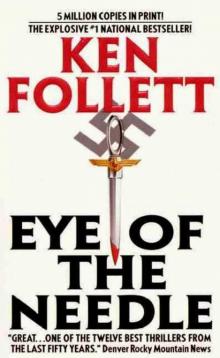 Eye Of The Needle
Eye Of The Needle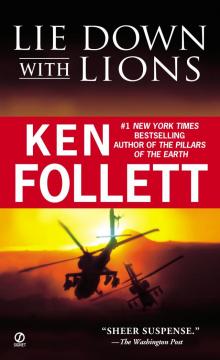 Lie Down With Lions
Lie Down With Lions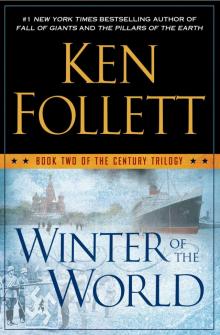 Winter of the World
Winter of the World Triple
Triple World Without End
World Without End Fall of Giants
Fall of Giants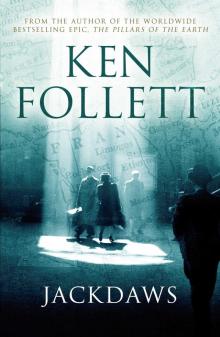 Jackdaws
Jackdaws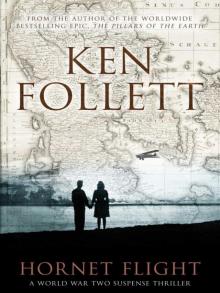 Hornet Flight
Hornet Flight Whiteout
Whiteout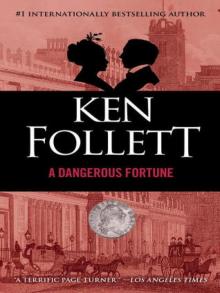 A Dangerous Fortune
A Dangerous Fortune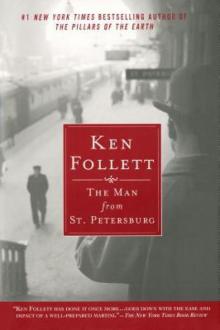 The Man From St. Petersburg
The Man From St. Petersburg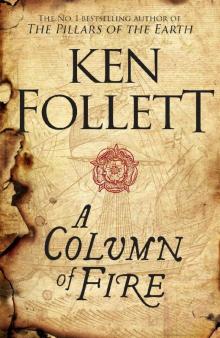 A Column of Fire
A Column of Fire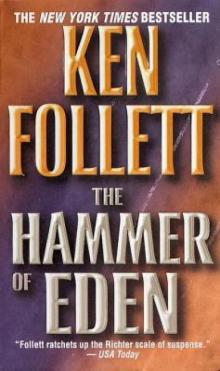 The Hammer of Eden
The Hammer of Eden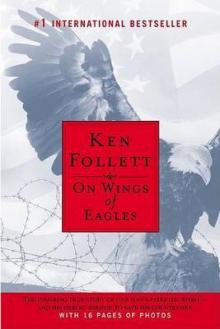 On Wings of Eagles
On Wings of Eagles The Evening and the Morning
The Evening and the Morning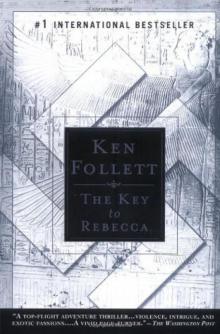 The Key to Rebecca
The Key to Rebecca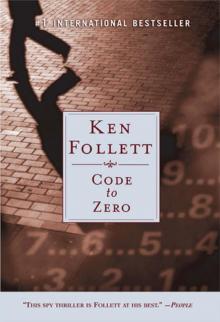 Code to Zero
Code to Zero Paper Money
Paper Money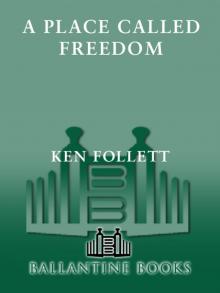 A Place Called Freedom
A Place Called Freedom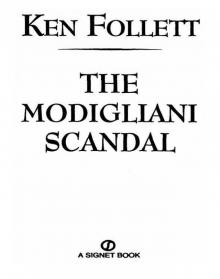 The Modigliani Scandal
The Modigliani Scandal Triple (1991)
Triple (1991)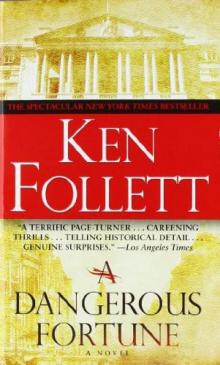 A Dangerous Fortune (1994)
A Dangerous Fortune (1994)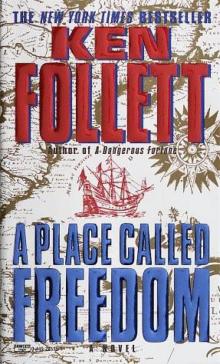 A Place Called Freedom (1995)
A Place Called Freedom (1995)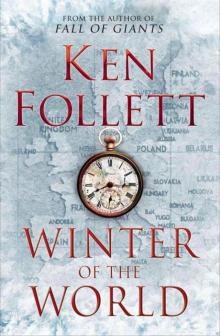 Winter of the World (Century Trilogy 2)
Winter of the World (Century Trilogy 2)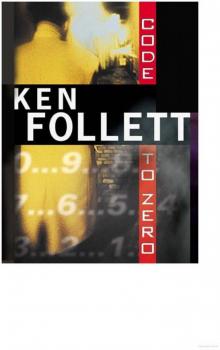 Code to Zero (2000)
Code to Zero (2000)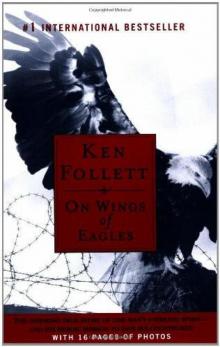 On Wings Of Eagles (1990)
On Wings Of Eagles (1990)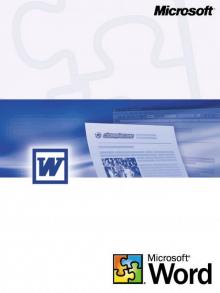 Storm Island
Storm Island Fall of Giants (The Century Trilogy)
Fall of Giants (The Century Trilogy)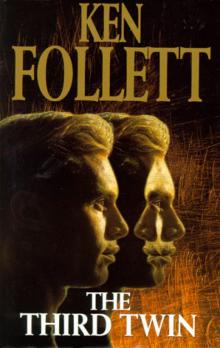 the Third Twin (1996)
the Third Twin (1996)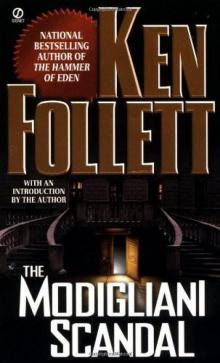 The Modigliani Scandal (1976)
The Modigliani Scandal (1976)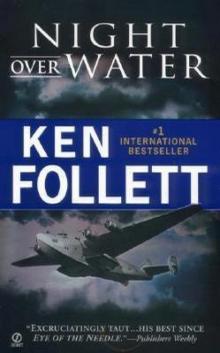 Night Over Water
Night Over Water